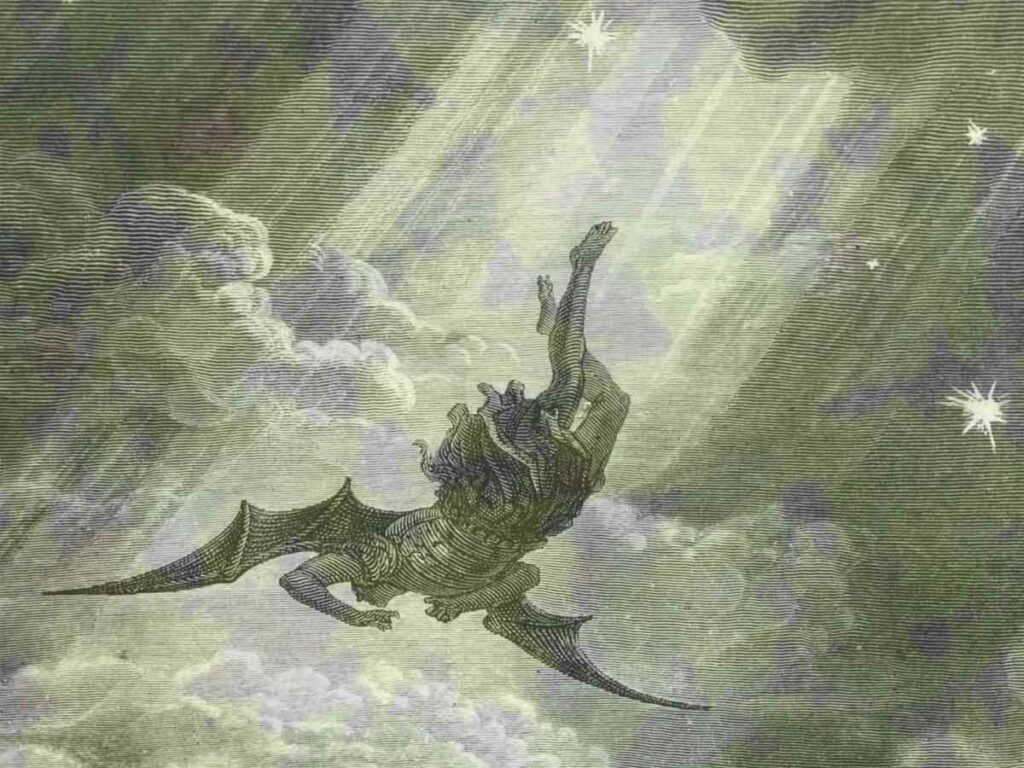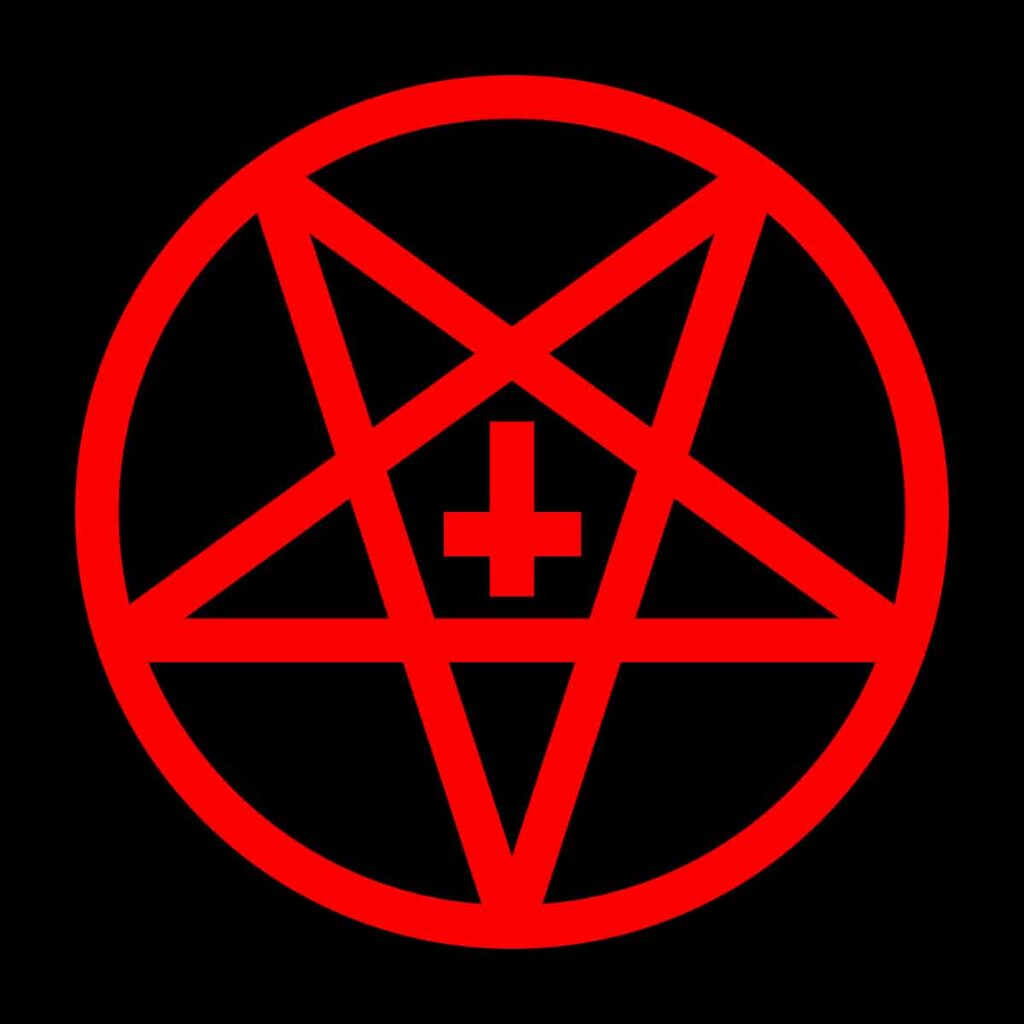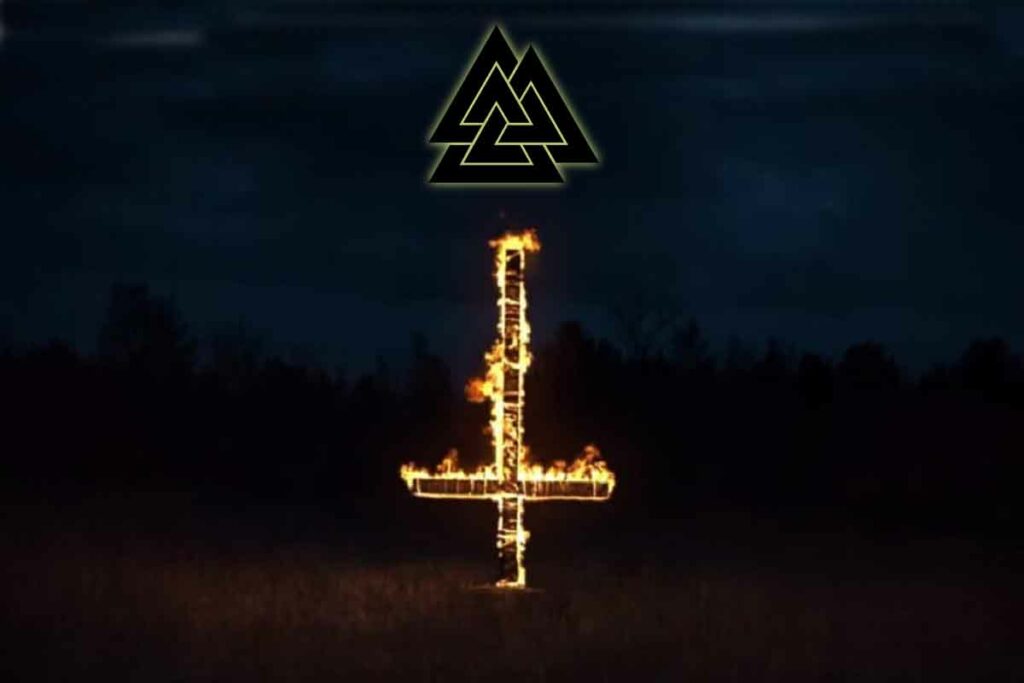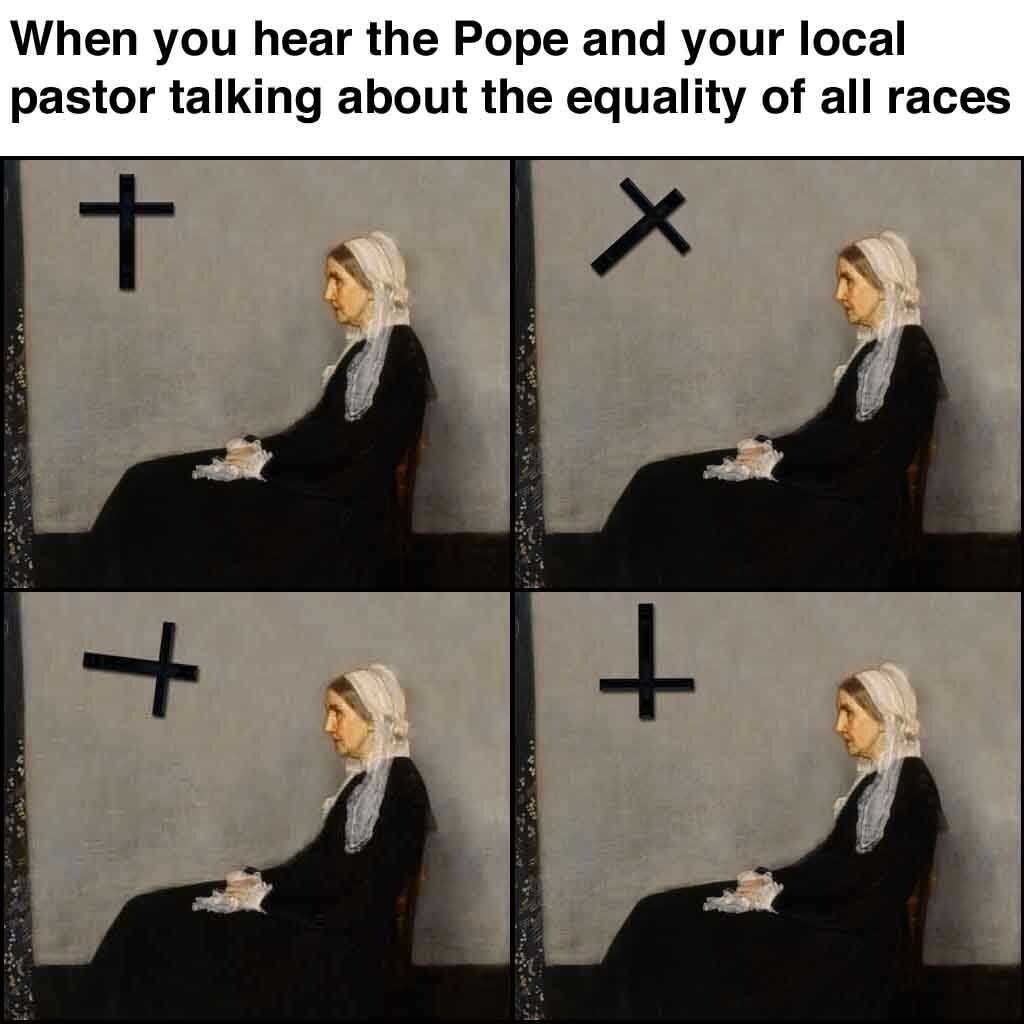Descent in Flames
Posted: August 3rd, 2022 | Author: Brett Stevens | Filed under: Order of Nine Angles | Tags: equality, garden of eden, National Socialism, Nihilism, plato, prometheus | Comments Off on Descent in Flames
All literature — this includes religion — focuses on the Greater War inside our heads. This is the point that Ur-Mah is trying to make on this site, although Nameless Therein adds the second component to this, which is that mental clarity leads to decisive action in the real world.
We are part of this world. Any other opinion is solipsism, which is the most common human framework for thought, explaining why most people are so oblivious to reality and prone to self-destruction. The question then becomes how to act without enforcing further solipsism.
If read as a battle for the mind of the individual, religious texts suddenly make more sense. The Tower of Babel is about how neurosis and diversity come from the same root; the Garden of Eden explains how in order to gain knowledge, we must sacrifice innocence.
The grandest of them all may the tale of Promotheus. In it, he steals knowledge from the gods only to pay a heavy price, but in turn, awakens the individual to the burden they carry. This parallels the tale of the Lydian Gyges from Plato, where unseen action reveals the individual.
In that tale, we see the fundamental confrontation of a human being with his own honesty: if you were given a ring that made you temporarily invisible, you would be a fool not to loot the world. But many of us would not because we see no utility in it, or at least would limit ourselves to the necessary.
If we imagine a king, we realize that he already has this ring through sheer power. He can make his enemies disappear and erase any evidence that crops up. He can terrify others into silence. If he wishes, he can steal everything and remain cloaked in the guise of goodness.
However, no king who is not a tyrant would do this. A good king knows that he faces the hardest judge of all, history, and that his reward will be to have an uneventful rule because he steered away from problems instead of chasing the infinite supply of illusions and wishful thinking that humanity creates.
A tyrant, on the other hand, has no need for the ring. He will simply kill, kill, kill until everyone who remains has either total loyalty to him or lives in such fear that they will deny the obvious facts that they can see with their own eyes.
Most human societies succeed at a basic level, then lose direction and bloat, at which point they become tyrannies. These societies can be of any size, whether a neighborhood, rock band, friend group, pub audience, or whole nation. That is the problem to beat, and the really hard problem.
The root of this problem consists not of the ego, although it leads to that through a defensive process known as “projection” and “pretense,” but of our desire to represent the world as a whole as how we see it in a moment, with what we know, and most of all, with our need imposed upon it.
Out of fear, they go to war against the organic and holistic, replacing it with human opinions, feeling, and control. They do not want the ambiguity of nature, the mystery of spirituality, or the variation of serendipity; they want safety so they can keep cranking in those bourgeois bucks.
The term bourgeois, by the way, has always meant the middle class from the cities who are not interested in maintaining civilization or sacrificing their lifestyles for the health of their culture. They seek, like parasites, to live off the excess wealth and channel everything into themselves.
Naturally this works about as well as a lead-winged plane or sugarcube boat because they entirely cut themselves off from any source of meaning and, with their fanatical focus on the self, quickly burn out their own ideas and live in a loop of distractions and obligations.
They will always go to work — of course! — and “work hard” which means show up and go through the motions for as many hours as needed. After that, they drop into EmptyLand, where their souls have nothing but television, alcohol, pop culture, sports, and progressive propaganda.
We used to blame the suburbs for these things but really, the cities brought it upon us. The suburbs showed a minor attempt to fight back by getting closer to natural land and away from the hive, but in the cities, the bourgeois “I got mine and get out of my way” mentality predominates.

The bourgeois mentality seeks to avoid anything holistic, or balanced by all the factors of reality, and natural, since that is not controlled by humans and feels threatening like death. Their ideology consists of running away from reality and stamping it flat with human intentions.
Its goal is to narrow focus in order to preserve a mental state of well-being based in denial of real problems and pursuit of symbolic, or easy and emotionally-satisfying, non-issues instead.
Much like how good science consists of data in pursuit of a thesis and bad science involves a thesis in pursuit of data, usually called “cherry-picking,” good thinking involves accepting all facts and consistent attributes of reality, where bad thinking selects only a few for its own convenience.
The human pathology starts with a clear goal like adaptation to reality, but once the minimum is achieved, drifts toward how to benefit the individual at the expense of anything larger like civilization, culture, and collected wisdom.
Eventually, the group adopts an outlook of reality denial because recognizing reality threatens its comfortable bourgeois mental state. It must pay attention to something beyond itself; that threatens the fundamental solipsism of the human being.
Religion reflects internal mental state. This either corresponds to reality or rejects reality. When humanity has conquered nature, it casts aside its old gods and replaces them with new ones made in its own religion. Not a golden calf idol, but the idealized human form, “individualism.”
As this worship infects the religion, it becomes a force for bad masked as one for good, and it becomes the duty of all to adopt the Luciferian/Promethean approach of discovering the world outside the walled garden created by narrowing focus.
To a Luciferian, the human problem remains not evil, but stupidity. Stupidity leads to narcissism and then reality-denial, at which point stupidity feasts with an endless series of symbols representing “good” and “evil” that distract people further from what is real.
While the organic reality consists of all things balancing each other, the human vision seeks what makes the individual human feel mentally comfortable. We know the world through our brains, and like symbols, we can then alter what our brains recognize as true in order to feel comfortable.
Think of the mouse digging for seeds in the top layer of soil. A sound whispers through the night; maybe it is a snake. But the mouse is hungry, so it denies the sound, and continues acquiring what makes it feel good — the seed — until the moment of the whiplash strike and silent insertion of the fangs.
We might also analogize to the Platonic cave: humans in the cave see shadows projected on the wall by the light of human consciousness, instead of realizing that they are seeing simple representations of a complex world, but they fear like Prometheus or Adam the burden that knowledge creates.
Knowledge tells us that our mental states do not matter; consequences in reality do. The more we recede into the former, the less we see the latter coming and take the often relatively simple steps required to avoid them.

Nature is composed of complexity, or simple patterns repeated at different places in a superstructure, leading to greater flexibility but also resiliency because of the internal similarity of the overall structure.
In the same way, parallels exist between patterns in nature across the domains of thought, energy, and matter. Religion shows us a parallel to the struggle against neurosis and for realistic clarity in the human mind, as well as the need for human groups to avoid neurotic self-destruction.
Interpreted this way, religion makes more sense because it shows us — as the ancient Hindus, PIE faith, and pagans did — that the spiritual quest is one of mental organization. The organized and realistic mind can see the beauty of existence beyond its terrors and find what goodness actually is.
This outlook, called “transcendentalism,” patterns itself after life as we live it. When we start as children, we find terrifying notions such as death, disease, and predation. As we mature, we see them as mathematically necessary parts of the entire structure.
Our greatest mistake — the one for which a Lucifer would be forbidden for rebelling against perhaps not God himself but the symbol of God in religion — repeatedly consists of removing transcendence by separating the world into “good” and “evil.”
This represents the core of hermeticism, Satanism, Luciferianism, pagan faiths, and the more enlightened forms of Christianity: we struggle against stupidity and self-centeredness, so that we can see reality, so that the transcendent can be born in us, mostly by avoiding good/evil binary and focusing on reality.
To a Luciferian, “good” refers to that which is strong like things in nature: healthy, resilient, stable, enduring, qualitatively improved, adapted to the organic whole of all facts of reality. Its opposite is not a thing so much as a lack of a thing, disorganization and confusion, including neurosis.
With this in mind, we can turn toward the O9A as two things in practice: first, the Greater War of making our heads clarified and discovering transcendental reality, including its metaphysical aspects, and second, the Lesser War of removing neurotic and parasitic orders from civilization.
After all, humans are tribal and herd animals. We require civilization. Even if we personally do not require it, we are affected by it, because with it our best creations live on beyond us, but with a bad one or without it, they vanish into the sand.
For all the raving that people do about “freedom,” what we really need is freedom from the illusions generated by the mind and the influence of those illusions on groups. We seek stability, which requires removing illusion.
Naturally that places one in opposition to what is popular, which is the idea that we can all do whatever we want, someone else enables this, and no one is at fault if things turn out badly. As usual, humans want to be gods, but an actual god would think more of the world around them.
In this we see the essence of the Promethean and Garden of Eden myths: the way to knowledge and self-mastery, which in the spiritual symbolism of religions is represented as godhood or divinity, leads through what is feared and painful.

Through that, the Luciferian mythos becomes complete. In order to achieve sanity and self-possession, the angel must fall out of the world of symbols into a world of nothingness, from which the self can be reborn without its egotistic pathologies.
No wonder we get statements like “it is better to reign in Hell than serve in Heaven.”
Turning to the O9A, we see a system of thought designed for the understanding of the spirit as a world. Humanity, given its place in the hierarchy, seeks to maximize quality and goodness by escaping from the psychic fug of the mass psychosis of humanity.
It embraces the transgressive because rules reflect the attempted control over method which is common to neurosis and not clarity. Clear thought, like natural selection, sets up a reward structure and rewards only those who achieve within it, then allows all else to pass on through starvation.
A human being freed from the symbolic world of the ego will not want to force others to comply with what is sane and normal; he seeks to collect those who can achieve that goal and to send all the others away. This requires a steely-eyed nihilism that rejects emotionality.
For example, what if you could make life better for the people of your nation by taking the top quarter and sending the rest away? You would have fewer people of vastly better quality, and therefore each person and every future generation would be much stronger.
Luciferianism like realism itself finds utility in forbidden ideas like social classes, eugenics, natural selection, adversity, and of course sensible methods of sorting populations like Nationalism, or the idea that each nation is comprised of only one ethnic group.
We see the forbidden and denied truth in many but not all taboo things. Taboos against child porn, for example, make sense, as do rules against unwarranted killing, assault, theft, and so on. It makes sense to ban dumping toxic waste, or even to shoot people who litter.
National Socialism in the O9A stands not for National Socialism the historical entity or the poorly-understood modern version, but a religious symbol for clarity of mind: independence from herd morality based on emotional symbolism, and absolute transcendent realism applied with force and death.
This does not mean that we need to like historical National Socialism so much as appreciate that it is the most divisive symbol of this time. Rejecting the internationalist diverse society and accepting differences between racial, ethnic, gender, and social class groups is how you get thrown out of Heaven in a modern era.
In the human struggle for mental clarity, you either try to limit the methods you use (means-over-ends) in order to be moral, or accept that a moral goal must be achieved by any methods (ends-over-means) and that to do otherwise is immoral.
We hear a lot about “the trolley problem.” A trolley is speeding down the tracks toward a group of people tied down across the rails; you can pull a lever, but that merely redirects the speeding trolley down another track where another group of people are tied down.
Do you pull the lever? Society has no answer because in its view all people are equal and all deaths are a tragedy, a belief which reflects the fundamental solipsism of those who make up the majority of our species, but ends-over-means says: it depends on who is on the other track.
If the default target of the trolley on Track A is a group of honor students, but the alternate Track B is stacked up with criminals, most of us will pull the lever out of pure animal instinct. We recognize that one group has more potential for good than the other.
If the trolley is speeding toward a heap of millions of average people, but on Track B there is a rare genius who might cure cancer or write a great symphony, the normal person says that we should “save lives” by killing the one rather than the many. Sanity says otherwise.
National Socialism in the O9A, like Luciferianism itself, means a willingness to break out of the conventional view of religion and therefore mental state as something which must be controlled in order to narrow focus to that which is socially acceptable.
In order to escape from neurosis, we can no longer fear the darkness. We must face what we fear and overcome that fear. That includes our fear of “scary” methods like war, violence, and natural selection, as well as our social and egotist paranoia of anything non-egalitarian.
When you fear the darkness, you are no longer entrapped in Eden or Heaven, where the symbolic unity of the whole replaces the need for conflict and opposites within the whole. Eden and Heaven replace the organic with a categorical order which labels “good” what is not feared and moves what is feared into scapegoat territory as “evil” along with some legitimate bads like pedophilia, theft, and rampant sodomy.
For this reason, it becomes essential that the O9A adopt sacraments like National Socialism (or at least Nationalism) and “culling.” To make our spirits bound to reality, we must first set them free so they dissolve and overcome freedom itself, and this requires being willing to break taboo.
If we look at religion as a symbol for the human consciousness, the major organized religions offer us the prospect of means-over-ends logic as a method of limiting our own impulses, but this does not quiet the genesis of those impulses, therefore makes us more neurotic.
Organized religion in general serves much the same role as a job. It keeps you weak and dependent on others so that you do not harm them, figuring that by limiting methods that cause harm, it can make Utopia, when in fact it allows greater harm to live because people are unwilling to harm it.
For example, imagine a young boy growing up in a farm community. He starts by setting fires, and seems unconcerned with what or who burns. Then he moves on to torturing animals. He dresses in female underclothes and starts to stalk women.
In the O9A world, a community elder sees this and recognizes the signs. This child will be a serial killer when he grows up. We can wait for him to claim his first victim or simply in the dead of the night drug him, take him from his bed, and bury him deep in the woods.
In the organized religion method, we wait for him to kill, then we all gather around symbolically with a trial or mass struggle session and decide he did wrong, then lock him up to steal resources from the useful for the rest of his life. This is means-over-ends.
By contrast, the O9A society avoids neurosis. It realizes that this animal is a bad animal and it puts him down in order to protect others. Was he innocent? He had not yet committed a crime, but he was almost certainly going to do so.
https://www.youtube.com/watch?v=9ORsinmqm0M
This terrifies the normie. The psychological model put forth by organized religion is that of solipsism, or the world being the self, because this keeps the individual imprisoned within their own desires, fixations, pathologies, and fears. It makes them the most malleable.
The normie will say that he wants “freedom,” but in our psychic model, freedom means nothing more than the ability to choose. He confuses external constraints on his actions with a lack of freedom, when his real slavery exists entirely in his head.
Of course, the bell curve exists, and for ninety percent of society, a lack of freedom is par for the course because they can never control their appetites. They need to be suppressed and taught to follow basic rules. Egalitarian societies also impose the same on the remaining ten percent.
When you leave Eden or steal the fire, you are out there alone in the darkness with nothing to guide you. Like Buddha under his yew tree or Jesus in the wilderness for forty days, you confront chaos and the death of self. Then, like Odin with his missing eye, you can find knowledge.
Any species born with advanced intelligence will be by nature solipsistic. It understands the world through its big brains, uses tools for its power, and communicates through symbols, therefore sees the world as both symbolic and a tool for increasing its own sense of safety and well-being.
When individuals transcend solipsism, they become aware, and create great and functional societies. This requires being willing to have a morality beyond good/evil methods, which instead looks toward some goals as constructive, productive, and creative, and everything else as irrelevant.
The irrelevant is parasitic at best in this model.
On the other hand, societies run by normies reflect the psychology of the normie. He needs a Daddy sky-god to keep him from doing something broken, and wants everyone else neutered so that he is safe from them and what they might notice if they know better than he does.
Most of all he fears the aristocratic man who rather than sorting the world into good and evil simply aims to improve what is around him, therefore will remove not only the Ted Bundies but the Homer Simpsons from reality. He culls the weak so that those who remain will be stronger.
The normies know that such aristocratic thinking is the path to success for humanity but they fear it because despite their solipsism, they worry that they may not make the cut. This neurotic thinking shows their mental slave-state; they could simply improve themselves instead of worrying.
Out of fear they narrow the focus from the holistic and the organic toward a few approved methods, safe symbols, and non-controversial topics for the sake of keeping the peace, enforcing unity, and allowing bourgeois commerce to continue unimpeded.
This narrowed view of reality translates the complexity of reality into binary symbolism and one-dimensional categorical thinking, setting up some things as universal and absolute “good” things and others as “evil.”
A nihilist — someone who rejects universal morality, truths, and communications — recognizes instead that egalitarianism is false and that there is no one rule for everyone. Those who know better must have more power. Those who know less must be constrained if not outright culled.
The O9A therefore unites the spiritual discipline of mental clarity with practice in reality. We engage in the Great Work so that we can perfect the lesser war, because great people leave behind them great civilizations. Anything else is a cop-out and we have no time for it.
